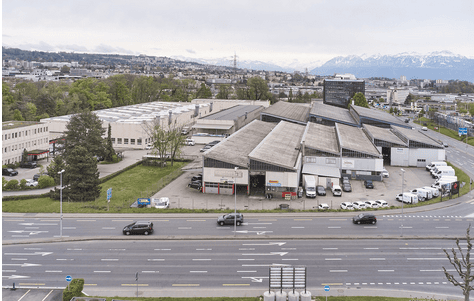Facility managers keep operations running
Disappointment for small and medium-sized enterprises: Standardized FM services are geared only for big players, but not for SMEs.
To date, there is hardly any generally accepted definition of this field of work. Because facility managers work in a wide field. They are business people, technicians, craftsmen and organizers all in one. Often they are also mediators between the fronts - and the good soul of the company, so to speak. They deal with the construction and renting of real estate, as well as with the planning of the required operating areas and the equipment of workplaces. Agreements and contracts with cleaning, catering and security services pass over their table.
"Facility managers are not noble janitors," affirms Susanne Baumann, president of the professional association fmpro.
"Facility managers are not noble janitors," affirms Susanne Baumann, the president of the professional association fmpro. The tasks required of a facility manager today are constantly increasing. They also involve specialists from the company and operations in the increasingly large and complex tasks. And in all of this, they pay attention to legal regulations, operational and safety requirements and act according to the principles: Cost optimization and cost efficiency. Says Susanne Baumann: "Efficient FM always pays off for companies, since around 80 percent of the costs of a property are incurred during the utilization phase.
Combining FM forces
The market for facility management in our country amounts to an estimated ten billion Swiss francs. The advice of FM professionals in assessing the life cycle costs of real estate is also increasingly in demand. These costs are high, especially for cleaning, monitoring and maintenance costs, and are a central topic among the leading professional associations IFMA Switzerland, FM Media AG, fmpro and SVIT FM Switzerland. Still missing process structures and imprecise or even no responsibilities contribute to unnecessary cost increases, according to FM specialists. Many FM service providers see things differently, and they themselves see their future as full-service providers. However, the individual service provider is obviously still in high demand and dominates the market.
Thus, many SMEs as well as the largest and most important real estate group, private homeowners, are uncertain about the right strategy and approach. Professor Hans-Rudolf Schalcher from the Institute for Building Design and Construction Management at ETH Zurich has long pointed to a lack of decision-making tools that can be used to analyze and assess the economic viability and risks of various renovation and refurbishment strategies for residential buildings with a reasonable amount of effort. In contrast, many professional investors and property owners have their own tools. They have the necessary technical and human resources to do so.
Standard work for real estate management
Together with the Zurich University of Applied Sciences (ZHAW) Professor Schalcher launched a corresponding project. He found that to date there are no methodologically coherent and scientifically supported solutions that link technical and ecological approaches with the financial feasibility of integral maintenance and repair concepts for buildings. A valuable contribution to this problem is made by the handbook published a few years ago for "Real Estate Management". The publisher of this 600-page standard work is the "Chamber of Independent Building Consultants" (KUB) of the Swiss Real Estate Association SVIT in cooperation with the ETH Zurich. Because of its holistic treatment and consideration of the entire life cycle of real estate, it differs from other textbooks and may even be unique in this respect.
So there have been decisive developments in the sector recently. For years, integrated planning of the subsequent management of real estate has been demanded as early as the project planning phase. Nevertheless, FM-relevant concerns still eke out a meager existence in the planning and execution phase. They are rarely taken into account and included in the overall construction planning process. It has long been confirmed: Once a property has assumed its task and function, operating costs and "surroundings" can only be influenced to an insignificant extent. Today, comprehensive and early FM planning in the areas of construction & technology is essential. That is why the Swiss Society of Engineers and Architects (SIA) addressed this problem and prepared a standard document: Recommendation SIA 113 "FM-compatible construction planning and realization"..
Practical guide and FM tender model
The best basic works, standards and recommendations are of little use if the required and formulated principles and services cannot be tendered and implemented accordingly. IFMA Switzerland, one of the leading FM trade associations, has created the CRB (Swiss Central Office for Construction Rationalization) and other project partners have developed a practical guide for the SIA 113 recommendation. The guideline "Planning and construction-related facility management, pbFM" takes up the standard requirements and gives concrete practical instructions for the implementation of the various FM tasks. The practical guide supports building owners as early as the ordering of services for planning and construction-related FM. The service providers receive a practical basis with aids and examples.
The already known Process/performance model ProLeMo as well as the Tender model Facility Management AM-FM of the aforementioned professional associations and organizations form the basic building blocks for the Standard Position Catalog "NPK Facility Management". This means that services can now finally be described, calculated and invoiced over the entire life cycle of a property, including the all-important management phase. The NPK FM consists of four parts: special provisions, preliminary remarks, service descriptions and forms. The service descriptions are grouped into three chapters: Strategy Processes, Control Processes, and Operational Processes. The Operational Processes chapter forms the main part of the new NKP and is divided into the following subchapters: Creation and Maintenance, Commercial Processes, Operations and Maintenance, and Services.
"The NPK Facility Management is mainly focused on these big players and managers due to the (paying) big project partners such as ETH Immobilien, Infra Post AG, Armasuisse Immobilien, Axpo, Implenia, Halter Immobilien, etc." CRB Project Manager Karl Liechti
Not suitable for SMEs
So can SMEs and small companies finally plan, tender and implement FM tailored to their operations? An inquiry with CRB project manager Karl Liechti brings disillusionment: "Due to the (paying) large project partners such as ETH Immobilien, Infra Post AG, Armasuisse Immobilien, Axpo, Implenia, Halter Immobilien, the NPK Facility Management is predominantly geared to these large players and managers. A later summary with simplifications for SMEs is planned. As a conclusion, one can take stock: The largest and most important real estate group is simply left to the left, so to speak - a pity.









